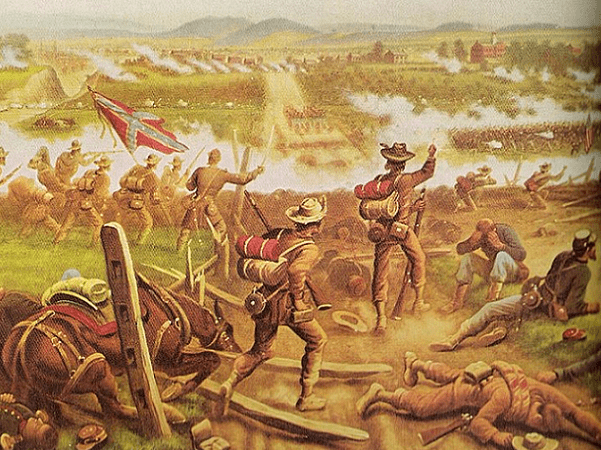Most historians agree that the Battle of Gettysburg on 1-3 July 1863, when a Confederate army attacking the North was defeated by Union troops, was the turning point of the Civil War.

Contemporary newspaper reports on the Civil War often provide interesting and valuable eyewitness accounts, containing many small details that humanize the story. For example, what was the Battle of Gettysburg like on its opening day, July 1, for the people living in that quiet Pennsylvania town? How did the women of the town react?

Here is the story from a news reporter who was right there with Union General George Gordon Meade’s Army of the Potomac when it was attacked by Confederate General Robert E. Lee’s Army of Northern Virginia that first day of the famous battle. He reported how the Federal troops initially held the ground west of Gettysburg but then, in the face of superior numbers, retreated through the town to take up positions on ridges and hills south of Gettysburg.
The dateline from his newspaper report was “Bivouac on the field” at 10 p.m. on July 1st – the battle’s opening day.

Here is a transcription of sections of this article:
A Full Account of the Battle of Gettysburg.
Bivouac on the Field,
West of Gettysburg, July 1st – 10 P.M.
[Confederate] Gen. Archer and his whole staff were taken. About fifteen hundred of the enemy’s men thus fell into our hands, and went to the rear. Small regiments were the order of this brigade, and when an Alabama Colonel was asked where the rest of his regiment was, he responded laconically, “Gone to hell, sir.”
One of these prisoners said to the other with some astonishment, “Hey, Jakey, we’re fighting the army of the Potomac now.” They seem to have thought they had hold of the militia.
As we passed through the town, shot, shell, and bullets were whistling musically around us, sometimes striking the houses. A shot richochetted [sic] over a regiment in front of me and pierced the wall of an inhabited house. A bullet grazed the ear of Captain Newcomb, with whom I was riding, and struck a house near us.
The ladies of Gettysburg deserve especially honorable mention. While we were retreating they came out upon the sidewalks, with composed though anxious faces, and offered our soldiers everything needful in the way of refreshments. The shot were whistling meanwhile, but they appeared elevated by noble impulses above the sentiment of fear. They took the most tender care of our wounded, as well as those of the rebels, who were captured during the day. How we grieved to leave this interesting town in the possession of rebel soldiers.
Note: An online collection of newspapers, such as GenealogyBank’s Historical Newspaper Archives, is not only a great way to learn about the lives of your ancestors – the old newspaper articles also help you understand American history and the times your ancestors lived in, and the news they talked about and read in their local papers. Did any of your ancestors fight at the Battle of Gettysburg? Please share your stories with us in the comments section.
Related Articles:
